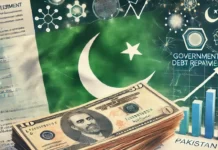- The banking sector plays a key role
By Syed Asim Ali Bukhari, Dr. Fathyah Hashim, and Pro. Dr. Azlan Amran
With the end of 2020, it is customary to look back and envision the journey forward. This decade is coming to an end, but unfortunately, it has not been the ending one would have hoped. Glancing towards the future, we see humanity entering the new decade with many unsolved and worsening problems such as the covid-19 pandemic, environmental degradation, natural resource depletion, widening economic and social development gaps between developed and developing nations, and much more. Five years ago, 193 members of the United Nations committed to adopt the United Nations Sustainability Development Goals (UN-SDGs). These 17 interlinked SDGs have to be achieved by 2030 for a better and more sustainable future for all.
Pakistan is one such developing country plagued by numerous environmental, social, political, and economic problems further intensified by the covid-19 pandemic. Pakistan committed to adopt the UN-SDGs 2030 in 2015. The current government has undertaken various socio-environmental initiatives in this regard. However, at this point, the attainment of the country’s UN-SDGs by 2030 seems like an improbable task. This is mainly due to the lack of synergy within the initiatives of the various stakeholders.
Up until now, an important stakeholder, which has not been fully integrated into the SDG strategic planning, is the Pakistan banking sector. The UN Secretary-General has identified more than $100 billion annual investment potential in environmental sustainability initiatives in developing countries The IFC is encouraging banks to engage in green finance. Currently, the IFC gave a $300 million blue loan to Indorama Ventures Public Company Limited”for recycling plastic bottles to minimize marine water pollution in Thailand, Indonesia, Philippines, India, and Brazil. Globally, the banking sector is powering the economy’s transition to environmental sustainability.
It is time that all the public and private institutions unite for the achievement of UN-SDGs 2030 and enter this new decade as a synergistic blend of green ideologies and initiatives. The sustainable development of a nation is not the sole responsibility of any single stakeholder. It is the combined responsibility of every stakeholder to ensure the creation of a ‘Clean and Green Pakistan’ in the next decade
The Government of Pakistan should create a strategic liaison between the State Bank of Pakistan (SBP), the seven SDGs Support Units established at the federal, provincial, and federally administered areas, and related regulatory authorities. Under the umbrella of Green Banking, SBP can roll out green financing schemes for various SDG initiatives. Pakistan’s sustainable development planning focuses on agriculture, health, energy systems, education, urban planning, and technology. The provision of green financing for these sectors can play a facilitative role in accelerating the UN-SDGs’ attainment. Pakistan is an agricultural country having substantial investment potential in the area of sustainable and digital agriculture. SBP can coordinate with the Ministry of National Food Security and Research to roll out green financing schemes for precision agricultural projects, digital agriculture, organic farming, and solar irrigation systems. These green financing schemes should provide low-interest loans to farmers practicing sustainable agriculture.
This synergistic blend can play a significant role in achieving multiple UN-SDGs such as SDGs # 1, 2, 3, 8, 9, and 17. It will not only increase the quality of crops and per-acre yield crop production, but also minimize the hazardous environmental impacts associated with unsustainable agricultural practices. The sustainable development of the country’s health sector and fulfillment of SDGs # 3 and 9 can be done with the construction of eco-friendly hospitals through green financing. Similarly, various green finance schemes can be launched for green IT infrastructure, eco-friendly vehicles such as hybrid or electric cars and MSME sector by SBP with collaboration of relevant stakeholders. The various construction schemes launched by Prime Minister Imran Khan, such as Naya Pakistan Housing Scheme and Ravi Riverfront Urban Development Project, can be converted to green housing projects and financed through banks’ green financing portfolios. Green construction can help to achieve SDGs # 6, 7, 8, 9, and 11. Integration of Green Banking and SDGs through green financing can result in a win-win situation for all concerned stakeholders.
SBP’s Green Banking initiatives can be a catalyst for the attainment of UN-SDGs 2030. The SBP should issue Green Finance guidelines and a framework for the banking industry under the Green Banking ideology and launch further Green Finance and Products Schemes for various economic sectors like the already launched finance scheme for renewable energy. Such initiatives by the SBP will lead the banking industry towards Green Banking adoption. Currently, most banks are focusing on their own adverse environmental impact reduction and have limited green financing portfolios. SBP can include SDGs financing as part of its Green Banking strategy and require banks to allocate a specific percentage of their financing portfolios to these goals. It should be reported as part of the bank’s green reporting periodically. Many countries, such as Malaysia, have made it mandatory for public listed organizations to report their sustainability activities. Similar sustainability reporting standards should be developed for all industrial sectors in Pakistan. All these initiatives will help to accelerate Pakistan’s SDGs attainment and green economy.
Seventy-three years ago, The Quaid-e-Azam gave this nation the motto of ‘Unity, Faith, and Discipline’. It has been termed as the national motto of Pakistan, but unfortunately, it has rarely been integrated into the country’s strategic planning. Unity and singularity of purpose among stakeholders are necessary for achieving the UN-SDGs. It is time that all the public and private institutions unite for the achievement of UN-SDGs 2030 and enter this new decade as a synergistic blend of green ideologies and initiatives. The sustainable development of a nation is not the sole responsibility of any single stakeholder. It is the combined responsibility of every stakeholder to ensure the creation of a ‘Clean and Green Pakistan’ in the next decade.
All authors, Syed Asim Ali Bukhari, Dr. Fathyah Hashim, and Prof. Dr. Azlan Amran, are associated with the Graduate School of Business, Universiti Sains Malaysia, Penang, Malaysia.























